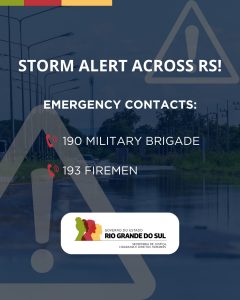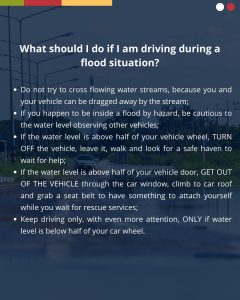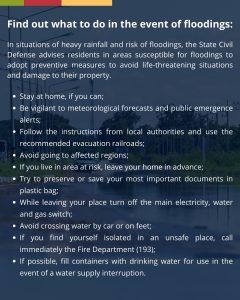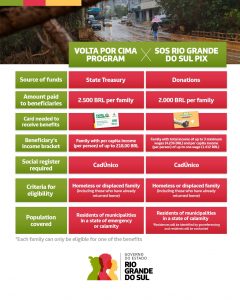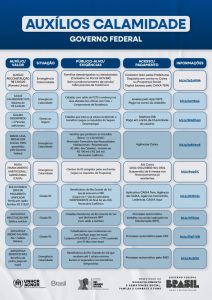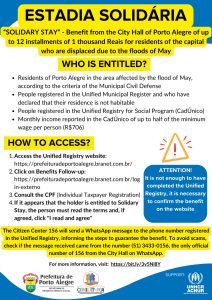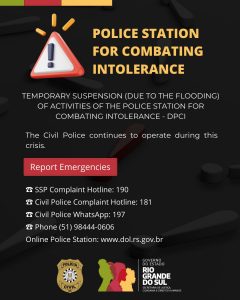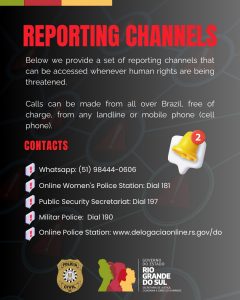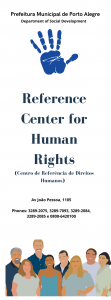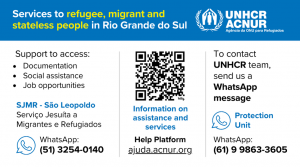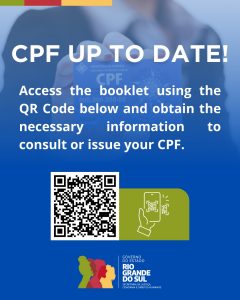Floods in Rio Grande do Sul
The heavy rains that began on 26 April unleashed floods across the state of Rio Grande do Sul, affecting more than 2 million people and forcing thousands to leave their homes.
Around 43,000 refugees and people in need of international protection are being directly or indirectly affected by the floods, 35,000 of whom were already among the most vulnerable groups in the state. Many lived in the regions and neighbourhoods most affected by the floods.
In Rio Grande do Sul, many people living in the areas hardest hit by the waters have had their homes damaged or destroyed, as well as their belongings and documents lost. Roads and motorways have been closed, streets flooded, and flights suspended. Shops and small businesses, including those run by refugees, have also been ruined. Some communities are isolated and unable to work.
UNHCR expresses grief over the deaths and impacts caused by the devastating floods in Rio Grande do Sul. The organisation is taking action to support people affected by this situation.
Below you can find information about the floods in Rio Grande do Sul.
!ATTENTION!
UNHCR is contacting refugees in Rio Grande do Sul.
If we call you on this number, please feel safe to answer.
Telephone: (61) xxxx-3605
In a situation of heavy rain and the risk of water overflowing, the Civil Defence of the State of Rio Grande do Sul advises residents of areas susceptible to flooding to adopt preventive measures to avoid life-threatening situations and damage to property:
- Stay at home if you can.
- Pay attention to the meteorological information and emergency alerts issued by the state.
- Follow the instructions of the local authorities and use the recommended evacuation routes.
- Avoid travelling to affected regions.
- If you live in a risk zone, leave it early.
- Keep important documents in plastic bags.
- When you leave, switch off the main electricity, water, and gas switches.
- Avoid crossing the areas where the water has overflowed, either by car or on foot.
- If you are stranded in an unsafe location, call the fire brigade immediately on 193.
- Fill containers with drinking water for use in the event of an interruption in access to water supply.
If you need rescue or assistance during the floods, it is important to know whom to turn to for fast and effective help. Always keep emergency numbers handy.
- Military Brigade: 190
- Fire Brigade: 193
- State Civil Defence: 199 and Chatbot/WhatsApp (51) 98401-2527
- Federal Public Defender’s Office: (61) 98352-0067 (WhatsApp) and [email protected]
1.Comeback Programme
(Programa Volta por Cima)
- What is it?
R$2,500 will be provided in a single instalment to family units who have become homeless or displaced due to the floods of May.
- Who is entitled?
People who have become homeless or displaced due to the meteorological events.
Families registered in the Unified Registry for Social Program (CadÚnico)
Families with income of max. R$218 per person;
One who has NOT received SOS Rio Grande do Sul Aid
- How can I check if the aid is available?
Access with your CPF: https://sosenchentes.rs.gov.br/consulta-programa-volta-por-cima
OR go to the CRAS closest to where you live.
- How can I register?
The registration period is now closed.
- How do I receive it?
The amount is credited to the Citizen Card (Cartão Cidadão). Those who do not have the card must collect it from a Banrisul branch from July 4th. Click here for more information on the Citizen Card.
For further information visit: https://sosenchentes.rs.gov.br/voltaporcima
2. SOS Rio Grande do Sul Aid
(Auxílio SOS Rio Grande do Sul)
- What is it?
Financial aid of R$2,000 in single instalment per family.
- Who is entitled?
People who have become homeless (see definition below) or displaced due to the meteorological event, or who were homeless or displaced but have already returned to their homes;
People registered in the Unified Registry for Social Program (CadÚnico)
People who do not currently receive assistance from the Volta por Cima programme, created by Decree 57.607 of 9 May 2024; and
People whose family income does not exceed three minimum wages.
- How can I register?
The registration period is now closed.
- How can I check if the aid is available?
Use your CPF to access: https://fpae01.pro.rs.gov.br/auxilio.php?grupo=20
OR go to the CRAS closest to where you live.
- How do I receive it?
Families can pick up the SOS Rio Grande do Sul card at any Caixa branch or service point. It can also be used as a debit card in any network accredited by Visa or Elo.
For more information on SOS Rio Grande do Sul Aid, visit: How to receive pix resources – SOS Rio Grande do Sul (sosenchentes.rs.gov.br)
3.Reconstruction Aid
(Auxílio Reconstrução)
- What is it?
Financial support worth R$5,100.00 in single instalment by the federal government to displaced or homeless families in Rio Grande do Sul.
- Who is entitled?
Families living in flood-affected areas who have temporarily or permanently abandoned their homes in municipalities in a state of calamity or emergency.
It is not necessary to register for the Unified Registry for Social Program (CadÚnico).
- How can I register?
The registration period is now closed.
- How can I check if the aid is available?
You can access your online account on GOV.BR at https://auxilioreconstrucao.dataprev.gov.br/reconstrucao/cidadao/ or you can go to the CRAS nearest to where you live.
- How do I receive it?
Caixa Econômica will automatically open a digital social savings account in the name of the beneficiary. If the person already has an account with Caixa, the money will be deposited into that account.
To find out about the rules and other questions about reconstruction aid, visit: https://www.gov.br/mdr/pt-br/auxilioreconstrucao#.
For more information about social benefits, click on the following image:
SOLIDARY STAY
(ESTADIA SOLIDÁRIA)
Benefit from PORTO ALEGRE
Benefit from the City Hall of Porto Alegre is provided in 12-months installment of R$1,000 per month for residents of the capital who are displaced due to the floods of May.
- Who is entitled?
– Residents of Porto Alegre in the area affected by the flood of May, according to the criteria of the Municipal Civil Defense
– People registered in the Unified Municipal Register and who have declared that their residence is not habitable
– People registered in the Unified Registry for Social Program (CadÚnico)
– Monthly income reported in the CadÚnico of up to half of the minimum wage per person (R$706)
- How to access?
1. Access the Unified Registry website: https://prefeituradeportoalegre.branet.com.br/
2. Click on Benefits Follow-up: https://prefeituradeportoalegre.branet.com.br/login-externo
3. Consult the CPF (Individual Taxpayer Registration)
4. If it appears as entitled to Solidary Stay, read the terms and, if agreed, click “I read and agree”
ATTENTION! Completing the Unified Registry is not enough; it is necessary to confirm the benefit on the website.
– For more information, visit: Registro Unificado (branet.com.br)
– For more information about the floods in Rio Grande do Sul in English, visit: https://help.unhcr.org/brazil/en/floods-in-rio-grande-do-sul/
MEI RS Calamidades
- What is it?
MEI RS Calamidades is a program created by the State Government to help and stimulate the recovery of micro-entrepreneurs (MEI) affected by the floods of 2024 in Rio Grande do Sul. In addition to the transfer of R$1,500.00, individuals will be able to access a series of in-person and online training courses on entrepreneurship and special lines of credit.
- Who is eligible?
Microentrepreneurs (MEIs) in municipalities in a state of emergency, registered in the federal and state tax databases, with active CNPJ and CPF, have not benefited from another state government program for those affected by the 2024 meteorological events.
- How can I access it?
Registration is automatically done with data from the Federal Revenue and State Revenue. Therefore, active CPFs and CNPJs with income at the addresses identified on the flood map will automatically receive the benefits.
- How can I check if the benefit is already available?
R$1,500 will be deposited directly to the SOS Rio Grande do Sul card registered with the CPF of the MEI holder identified in the flood zone.
In order to verify one’s eligibility, the person can check their CPF at the following link: Programa MEI RS Calamidades.
The card can be withdrawn at Caixa branches (nas agências da Caixa) upon presenting a photo ID or biometric data. One can also transfer funds through the Caixa Tem app.
*If you meet the requirements but have not received the benefit linked to your CPF, you can file an appeal during 24-31 July!
For more information, visit: MEI RS Calamidades – SOS Rio Grande do Sul (sosenchentes.rs.gov.br)
If you have experienced gender-based violence in a shelter, here are some recommendations for actions you can take to ensure your safety:
- Identify a Reference Person: Identify a key person from organisations or shelter managers who can provide guidance on how to proceed in a situation of violence.
- Keep an Emergency Contact List: Keep a list of emergency contacts, including phone numbers of family members, trusted friends, and emergency services.
- Access to Free Services: Remember that health and protection services against gender-based violence in Brazil are free of charge and everyone – regardless of their nationality and whether or not they have documents – has the right to access those services.
The Ministry of Women’s Affairs has set up the following helplines:
? The Women’s Call Centre has a special service to receive and refer reports of violence against women during this rainy season in the state.
? And it has been providing information about shelters exclusively for women and children in the affected region.
You can call 180 and dial “7” or call WhatsApp at (61) 9610-0180.
In the event of discrimination, prejudice, and xenophobia, you can contact the Police Station for Combating Intolerance (DPCI) – a Civil Police body linked to the State Department for the Protection of Vulnerable Groups (DPGV) – whose activities have been temporarily suspended due to the flooding.
During this period, the DPCI has set up a number of reporting channels that can be accessed whenever human rights are being threatened. Calls can be made from all over Brazil, free of charge, from any landline or mobile phone.
- 190 Disque Denúncia (Hotline) -SSP
- 181 Civil Police Hotline
- 197 Civil Police WhatsApp
- Phone/WhatsApp (51) 98444-0606
- Online Police Station: www.dol.rs.gov.br
- www.delegaciaonline.rs.gov.br – Online Police Station website
In case of a human rights violation you can find help at Reference Center for Human Rights (Centro de Referência de Direitos Humanos – CRDH)
- What is the CRDH?
The Reference Center for Human Rights (CRDH) is a service run by the Porto Alegre City Hall, which provides trained professionals to welcome, diagnose, inform, and guide victims of human rights violations. The CDRH’s activity is to welcome/assist people who are exposed to situations of human rights violence. It is a service open to free demand for guidance, mediation and referral of users to the service network.
- Who is the CRDH for?
Any citizen and/or vulnerable group whose rights have been violated and/or subjected to inhuman or degrading treatment in a discriminatory and prejudiced context:
LGBTQIAP+
Elderly people
People with disabilities
Indigenous people
Homeless people
Migrants and refugees
Victims of human trafficking
Victims of ethnic/racial discrimination
Intrafamily violence
Urban violence
- Which professionals are available at the CRDH?
The Center has a team of professionals who provide interdisciplinary care. These professionals attend to service users in person, at the CRDH headquarters, or by telephone. Telephone assistance is also an option. Whenever the chosen channel, it will be given the appropriate reception and referral.
- When to go to the CRDH?
The CRDH can be contacted in all situations involving human rights violations. Based on the assistance provided by the professional.
- How to obtain support?
At the CRDH headquarters: Avenida João Pessoa, 1105 – from 8:30 a.m. to 4 p.m. Monday to Friday
Phones: +55 51 3289-2075, 3289-7093, 3289-2084, 3289-2085 e 0800-6420100
For more information, click on the booklet below:
For reliable and up-to-date information on Rio Grande do Sul, visit official communication portals such as:
- Website of the Government of the State of Rio Grande do Sul: Latest News – Portal of the State of Rio Grande do Sul
- SOS Rio Grande do Sul website of the Rio Grande do Sul Secretary of Communication: SOS Rio Grande do Sul (sosenchentes.rs.gov.br)
The Communication Crisis Office, linked to the Rio Grande do Sul Communication Secretariat, has created the Centre for Combating Disinformation, a task force to check and challenge false content related to the floods. The information is identified, monitored, and verified by a communications team. When the check is complete, the content is made available to press groups and on the government’s official website and profiles.
You can find all the materials collected on the SOS Rio Grande do Sul website: Combating disinformation – SOS Rio Grande do Sul (sosenchentes.rs.gov.br).
1. Click on the image below to access the booklet on rights of people affected by rain in Rio Grande do Sul.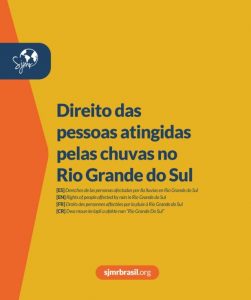
2.Click on the image to access the WhatsApp number to contact UNHCR or its partner Jesuit Migrant and Refugee Service in Rio Grande do Sul
3. Click on the image below to access information on how to consult or issue your CPF.

